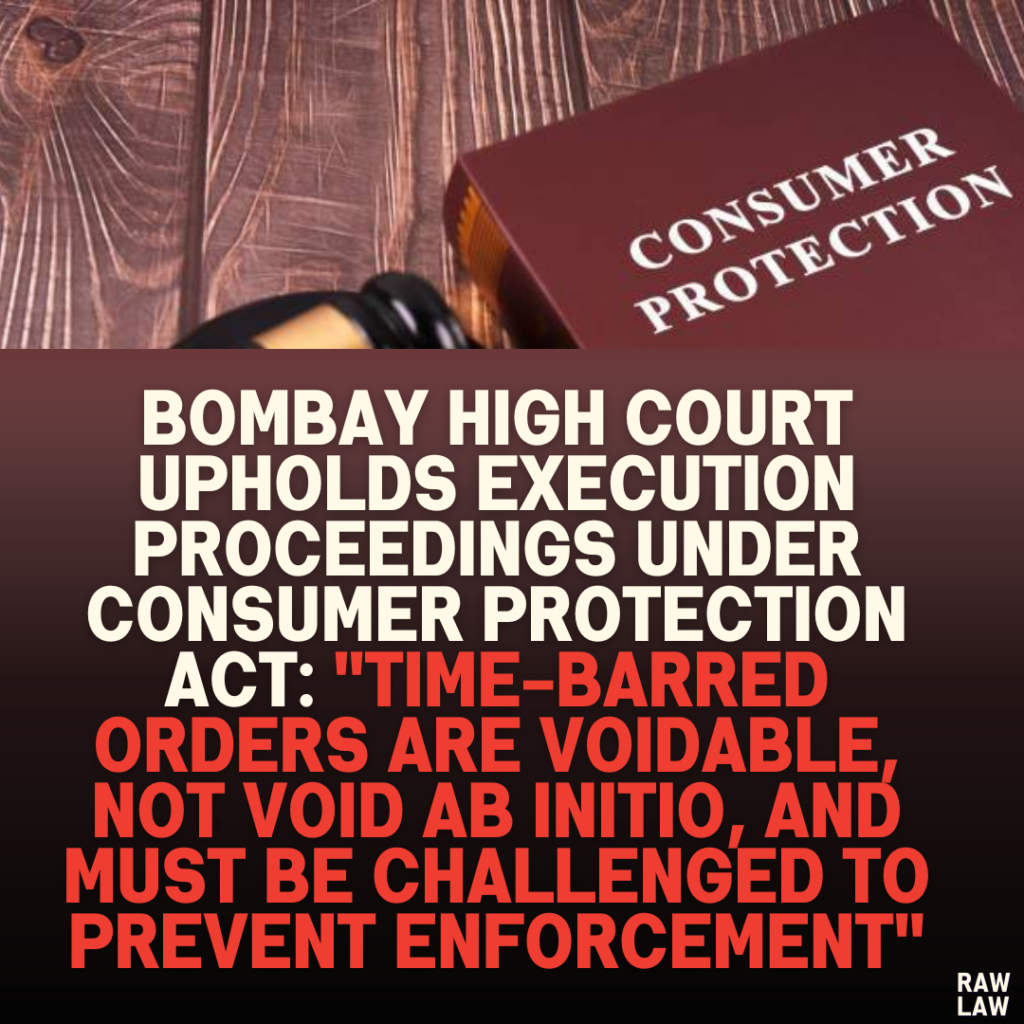Court’s Decision
The Bombay High Court dismissed a writ petition challenging execution proceedings under Section 27 of the Consumer Protection Act, 1986. The Court held that an order passed in a time-barred complaint is not void ab initio (invalid from the outset) but remains binding and enforceable unless set aside by appropriate appellate or revisional proceedings. Therefore, execution proceedings for such an order can be maintained.
Facts
- Nature of Dispute:
- Respondent Nos. 2 to 4 had invested in term deposits with an urban cooperative credit society.
- When the term deposits matured, the amounts were not refunded. Consequently, they filed a consumer complaint in 2017 seeking refund and interest.
- Consumer Forum’s Order:
- The District Consumer Disputes Redressal Forum allowed the complaint on July 12, 2018, and directed the refund.
- Since the petitioner (opposite party) did not comply with the order, the respondents initiated execution proceedings under Section 27 of the Consumer Protection Act, 1986, which imposes penalties for non-compliance with Consumer Forum orders.
- Challenge by the Petitioner:
- The petitioner, a chairman of the credit society, argued that the original consumer complaint was filed beyond the limitation period prescribed under Section 24-A of the Consumer Protection Act (two years from the date of cause of action).
- No condonation of delay was sought or granted by the Forum, rendering the order non est (null and void).
Issues
- Can execution proceedings under Section 27 of the Consumer Protection Act proceed if the original order is passed in a time-barred complaint?
- Does failure to condone delay in a time-barred complaint render the Consumer Forum’s order void ab initio and unenforceable?
Petitioner’s Arguments
- Limitation Period Violated:
- The term deposits matured in 2013, making the cause of action arise on January 4, 2013.
- The consumer complaint, filed in May 2017, was well beyond the two-year limitation period under Section 24-A of the Consumer Protection Act.
- Mandatory Condonation:
- Section 24-A(2) mandates that a complaint filed after the limitation period cannot be entertained unless the delay is condoned with written reasons.
- No condonation of delay was recorded, violating this statutory requirement.
- Jurisdictional Defect:
- The Forum’s order, passed in violation of the limitation provision, was argued to be void ab initio and therefore could not form the basis for execution proceedings.
- Precedents Cited:
- The petitioner relied on judgments emphasizing that orders passed without condonation of delay are illegal and without jurisdiction (Ragho Singh v. Mohan Singh; State Bank of India v. B.S. Agricultural Industries).
Respondent’s Arguments
- The Consumer Forum’s order was unchallenged by appeal or revision, making it final and binding.
- Procedural defects, such as delay in filing the original complaint, do not render the order void ab initio.
Analysis of the Law
- Section 24-A of the Consumer Protection Act:
- Complaints must be filed within two years from the date of cause of action.
- Delays can be condoned if the Forum provides written reasons for sufficient cause.
- However, failure to condone the delay does not inherently void the order; it makes it erroneous but not null.
- Distinction Between Void and Voidable Orders:
- Void Orders: Orders passed without inherent jurisdiction (e.g., lack of authority over subject matter) are void ab initio and unenforceable.
- Voidable Orders: Orders with procedural defects (e.g., failure to condone delay) are binding unless set aside by a higher authority.
- Supreme Court Precedents:
- In Ittavira Mathai v. Varkey Varkey and Bhawarlal Bhandari v. Universal Heavy Mechanical Lifting Enterprises, the Supreme Court held that time-barred orders are not void ab initio. Instead, they are erroneous and must be challenged through proper appellate channels.
- Execution Proceedings:
- The Consumer Forum’s order, though passed in a time-barred complaint, was not challenged. Therefore, it retained its binding nature and could be enforced in execution proceedings.
- Unique Scheme of the Consumer Protection Act:
- Unlike civil suits under the Limitation Act, the Consumer Protection Act allows condonation of delay in original proceedings. This procedural flexibility does not change the binding nature of orders passed without condonation unless they are overturned.
Precedent Analysis
- Ragho Singh v. Mohan Singh: Orders passed in delayed proceedings without condonation are erroneous but not inherently void.
- State Bank of India v. B.S. Agricultural Industries: The limitation period must be strictly adhered to, but the failure to do so renders the order voidable, not void.
- Urban Improvement Trust v. Gokul Narain: Procedural defects do not equate to inherent lack of jurisdiction.
Court’s Reasoning
- Procedural Error vs. Jurisdictional Defect:
- The Court clarified that the Consumer Forum had jurisdiction over the subject matter and parties. The failure to condone delay was a procedural error, not a jurisdictional defect.
- Binding Nature of Unchallenged Orders:
- Since the Forum’s order was not appealed or revised, it remained binding and enforceable, even if procedurally flawed.
- Execution Proceedings Valid:
- The procedural flaw in the original complaint did not render the order void ab initio. Therefore, execution proceedings could proceed.
Conclusion
The Bombay High Court dismissed the writ petition, emphasizing that procedural defects such as failure to condone delay do not render an order void ab initio. Execution proceedings under Section 27 of the Consumer Protection Act were deemed maintainable.
Implications
- Parties must challenge erroneous orders through appropriate appellate or revisional channels within the statutory framework. Failure to do so renders the order binding and enforceable.
- The judgment clarifies the distinction between jurisdictional errors and procedural defects, reaffirming the principle that only orders without inherent jurisdiction are void ab initio.
